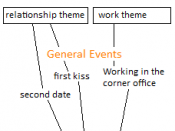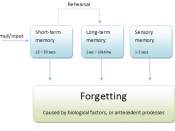To effectively study memory it is first necessary to categorize different types of memory. There are dozens of ways to divide the specific types of memory. These concise categories all have very different characteristics and the acknowledgement of different types of memory makes the broad topic more manageable. First, there may be a distinction made between long term memory, short term memory, and working memory. Within the long-term memory, there are two main divisions: semantic and episodic memory. Semantic memories contain knowledge regarding the meanings of words, symbols, and algorithms. Episodic memories, on the other hand, include information of a personal nature. These memories capture the temporal and spatial context of a person's past experiences and encode it in a narrative way. Because they are encoded as a narrative, an individual can recall the memories and essentially be telling a story.
Autobiographical memories (episodic memories) are also referred to as personal event memories. These memories have several prominent characteristics. First, each memory corresponds to a specific moment or event, rather than a general event or series of events. Secondly, each memory contains many details of the personal circumstances associated with the memory. Finally, each is filled with sensory information that promotes a sense of re-experiencing the event. These memories contain information regarding place, actions, persons, objects, thoughts, and feelings. Since knowledge of an experience is coupled with temporal and spatial context, an association between autobiographical memories and cues pertaining to those memories exists. This is evident when using the Galton-Crovitz cue keyword method.
The Galton-Crovitz cueing method aims to obtain a random sample of all memories, stratified through the use of suitable keywords. The frequency of the memories recalled from a given time period can be interpreted as an estimate for the probability that one will...


